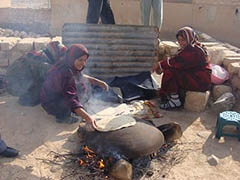The following story by Mahmoud Solh, Director General of the International Center for Agricultural Research in the Dry Areas (ICARDA), was originally published on the Arab Spatial Food Security Blog.
The string of upheavals in the Arab region in the past three years has been a culmination of several factors, but it’s hard to ignore some hard-hitting facts on the status of food security and unemployment in the region – perhaps even suggestive of a crisis that had been simmering for a while.
The Middle East and North Africa (MENA) region has one of the highest unemployment rates in the world, with the youth unemployment rate 80% higher than the world average. Based on IFAD data, the current unemployment rate among the young aged 18-29 years ranges from 18% in Morocco to 24% in Egypt, to an alarming 48% in Syria and 53% in Yemen. Furthermore, most countries in the region are at grave risk of food insecurity, with the exception of the oil-rich countries which constitute less than 10% of the region’s total population. The MENA region is the largest food importer in the world; in 2010 the region imported 65.8 million tons of cereals compared to Asia’s 58.8 million tons, despite the huge difference in their respective populations. A large chunk of these imports is wheat – a staple diet in most Arab countries. The street riots in Egypt, Morocco and Yemen in 2008 – following the sharp rise in wheat prices during the global food crisis – is a reminder that in situations where other grievances, such as high unemployment rates, already exist, food insecurity is a known trigger for human conflict.
In our years of research with the national partners on the dryland production systems typical of the region, ICARDA found that sustainable increases in food productivity – even with the region’s scarce natural resources – is not only well within reach, but also potentially transformative of food security. In Arab countries, actual farm yields of crops are far below their potential – a gap that offers a huge opportunity to boost self-sufficiency in the region, as was demonstrated in Syria. There, a combination of improved wheat varieties with enhanced water management, timely inputs, and appropriate policies was able to transition the country from a wheat importing to a wheat exporting status. Another project aiming to enhance food security in the region is supported by; the Arab Fund for Economic and Social Development (AFESD), the Kuwaiti Fund for Economic Arab Development, and the Islamic Development Bank (IDB), showed average wheat increases from 25% up to 75% in three years in seven Arab countries.
Water is another flashpoint for conflict in the Arab region – the most coveted natural resource in dry areas. In MENA, irrigation consumes 80-90% of all fresh water used. Given climate change and growing population pressures in the region, water extraction rates are rising and groundwater levels are falling significantly. While the global average for per capita water availability is 8,900 m3, it’s only 1,100 m3 in the Arab region, estimated to drop down further to 550 m3 by 2050 – a disastrous scenario for sustaining the region’s growing population. Technologies along with policy and institutional interventions can turn this trend around by improving water productivity in agriculture. Interventions like switching to raised bed farming, modifying cropping patterns, using supplemental irrigation in rainfed areas and macro- and micro-water catchments in low-rainfall areas have demonstrated substantial gains in water productivity – both at the farm and basin levels.
Events like the turmoil in some Arab countries and the 2008 global food crisis should be heeded for their underlying causes so that future risk can be reduced and livelihoods secured for the vulnerable population. The soaring commodity prices and shortage of food supplies experienced during the food crisis did raise serious food security concerns across all Arab countries. Governments placed investment in agriculture high amongst their national priorities in an effort to enhance food self-sufficiency. In the past, the only Arab fund that invested in agriculture development was the AFESD. Now other Arab agencies, such as the IDB and the Kuwait Fund are investing for the first time in agriculture and food security – a promising development. But far more concerted efforts are needed.
A long-term, multi-sector regional strategy is needed to address the complex challenges facing the Arab region – low productivity, scarce natural resources, which are predicted to deteriorate even further with climate change, and the rapidly rising demand for food. Such an investment opens a path to infusing the rural communities in the region with a much needed stabilizing force – food security for the people, improved rural livelihoods, and a youth gainfully employed from a thriving agriculture sector.







